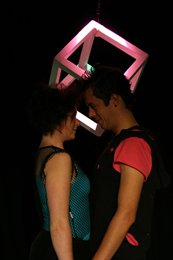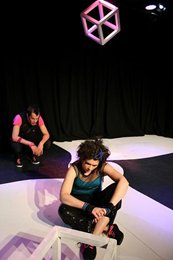Permeated by a sense of entrapment, the theatre of Enda Walsh is at its best when performed in intimate spaces. While real freedom seems just beyond the grasp of many of his characters, his romantic two-hander Disco Pigs is more hopeful than much of his later work. As the adventures of Pig and Runt descend into chaos, we anticipate that Runt, at least, will break out of the psychological box the two have built around themselves. In this context, the creative approach of Fregoli, under the skilled directorship of Rob McFeely, was fitting; throughout, there was a palpable sense that Galway’s Town Hall Studio could not contain this production’s effervescent energy.
 Bursting the seams of the stage, Shane McDermott (Pig) and Maria Tivnan (Runt) engaged the audience’s assistance to create their world of Pork (Cork) city. Early in the production, Tivnan reached out to pinch my cheek; another audience member became a bus driver and a victim of Pig’s obnoxious, teenage tirade as McDermott fixed his eyes on him while he spoke. Initially, the audience interaction had a jolting effect. Yet, if audience members edgily wondered who the actors would approach next, Tivnan and McDermotts’ performances were powerful enough to distract from this and to truly enthral.
Bursting the seams of the stage, Shane McDermott (Pig) and Maria Tivnan (Runt) engaged the audience’s assistance to create their world of Pork (Cork) city. Early in the production, Tivnan reached out to pinch my cheek; another audience member became a bus driver and a victim of Pig’s obnoxious, teenage tirade as McDermott fixed his eyes on him while he spoke. Initially, the audience interaction had a jolting effect. Yet, if audience members edgily wondered who the actors would approach next, Tivnan and McDermotts’ performances were powerful enough to distract from this and to truly enthral.
Both actors aptly oscillated between the playful and the emotive. McDermott, himself a Galwegian and founding member of the company, demonstrated an impressive command of the Cork accent. Tivnan was at her best during the production’s closing moments as Runt attempts to correct and normalise her speech. Punctuated by pauses and with a pensive expression, her delivery during these moments poignantly captured the essence of Walsh’s thematic flirtation with freedom. McFeely’s lighting, as well as his directorial blurring of the divide between spectators and actors intensified these moments. Under a glow that evoked sunrise, Tivnan moved into the audience, a couple of rows from the stage, for her final speech. This served to conjure the tantalising prospect of her escape.
With a bare set and two box-shaped wooden frames as the actors’ only props, the production demanded imaginative decisions in terms of lighting, costume and music. The music, also chosen by McFeely, harmonised with the rhythms of Walsh’s script. As Pig and Runt embarked on Pork city’s clubbing  scene, dreamy, trace-style tunes accompanied meditative moments while fast-paced, climactic scenes were amplified by hard house. During these scenes, McFeely’s colourful strobe lighting and the actors’ vigorous movements imbued the set with a disco vibe. Tivnan and Rebecca Ryan’s costume design, captured a 90’s clubbing style. The actors wore coloured tops covered in black netting and Runt’s garish make-up subtly nodded to Commedia dell'Arte. Ultimately, Fegoli’s imaging of the characters further circumscribed their difference – especially from those “students” (the audience) whom they abhor.
scene, dreamy, trace-style tunes accompanied meditative moments while fast-paced, climactic scenes were amplified by hard house. During these scenes, McFeely’s colourful strobe lighting and the actors’ vigorous movements imbued the set with a disco vibe. Tivnan and Rebecca Ryan’s costume design, captured a 90’s clubbing style. The actors wore coloured tops covered in black netting and Runt’s garish make-up subtly nodded to Commedia dell'Arte. Ultimately, Fegoli’s imaging of the characters further circumscribed their difference – especially from those “students” (the audience) whom they abhor.
Tivnan and McDermott embodied that intimidating yet needy quality of troubled youths in a production that both constructed and tested the seemingly impenetrable bubble of adolescence. Having revived their critically acclaimed production of Bedbound in 2009 and successfully produced Disco Pigs in 2010, Fregoli seems to be captivated by Walsh’s work. Hopefully, this will be a fruitful and enduring attraction; performing in small venues, the fast-paced energy and madness that characterises this company offers the ideal forum for the warped and vibrant worlds of Enda Walsh.
Siobhán O’Gorman is currently completing a doctoral research project on gender and the canon in contemporary theatre at the National University of Ireland, Galway.